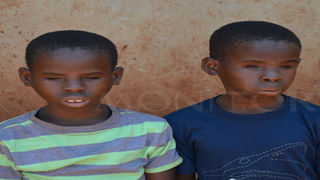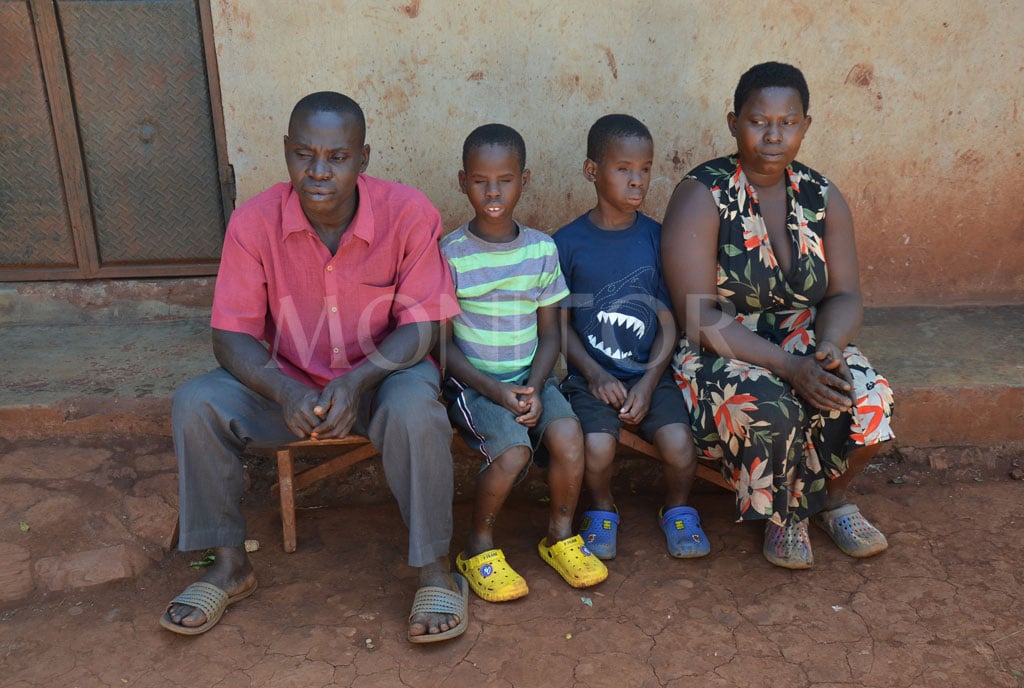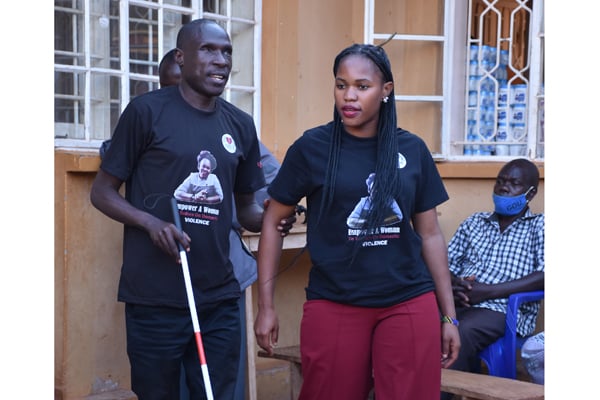
Bright Tenywa Irongo and Aman Waiswa Zirimeyi. PHOTO/TAUSI NAKATO
|Healthy Living
Prime
The agony of raising blind twins
What you need to know:
- Experts say a baby’s defects may be due to maternal infections caused by organisms that cross the placenta such as rubella.
- This is why mothers are encouraged to go for antenatal care the moment they find out they are pregnant.
On November 24, 2012, a heavily pregnant Scovia Nanangwe, a resident of Kagera Trading Centre in Jinja City, was accompanied by her husband Ronald Irongo to Lukolo Health Centre III in Budondo Ward, Jinja City. Although they thought they were to have one baby, the health workers said it was twins.
After some hours of labour, Nanangwe delivered the boys. However, her joy was short-lived because after examination by the health workers, she was told that the boys were blind. Immediately after getting the bad news, her husband abandoned her in hospital, leaving her at the mercy of a stranger who helped her return home.
The now 10-year-old identical twins, Bright Tenywa Irongo and Aman Waiswa Zirimeyi, who are the third born in a family of eight children do not have retinas.
Abandoned
Irongo believes since all his other children are not blind, then the boys belong to another man. Because of this, he abandoned his family, leaving Nanangwe to take care of the babies and other children on her own.
“I had to look for a way to get money in order to feed and clothe my children. This meant going to people’s homes to dig as well as wash their clothes,” she says.
Loss of hope
Nanangwe had hoped for a solution from the hospital but even this was taken away after being told that the boys’ blindness is permanent because they lack retinas.
“I took the twins to Jinja Regional Referral Hospital for a checkup and I was told that there is no way they can be helped to see. I sought another opinion at Mengo Hospital in Kampala, but even here, I was given the same bad news,” she says.

Bright Tenywa Irongo and Aman Waiswa Zirimeyi with their parents. PHOTO/TAUSI NAKATO
Nanangwe says she is now happy because she accepted that her twins’ condition is permanent. Thankfully, after two years of separation from his wife, Irongo finally returned home.
He says he decided to stop looking at the twins as a curse but a blessing in disguise because of the many opportunities they have brought them.
“Friends and organisations such as Blessing Uganda Foundation have helped us cope. The boys now attend St Francis School of the blind in Soroti City. They have also supported me in modernising my farming activities by availing me with a spray machine and pesticide. This has improved my output and the money I get has enabled me to renovate my house,” he says.
Experts
Dr Grace Ssali, a consultant ophthalmologist says blindness among unborn babies happens in the first few months of conception in case the mother gets an infection. The most feared infections during pregnancy are rubella, toxoplasmosis, others (such as syphilis, varicella, mumps, parvovirus, and HIV), herpes, cytomegalovirus (CMV) and syphilis. “These are referred to as TORCH in the medical world and while all lead to deformities among babies, in the case of causing blindness, rubella is the most common,” she says.
Dr Daniel Balina–Nseko, a consultant ophthalmologist, further explains that the defects on a baby are due to maternal infections caused by organisms that cross the placenta such as rubella. “The defects are varied and usually occur when the deadly organisms cross the placenta during the first trimester. It is during this period when organogenesis (is the phase of embryonic development that starts at the end of gastrulation and continues until birth. During organogenesis, the three germ layers formed from gastrulation form the internal organs of the organism) happens,” he says.
Owing to these infections, Dr Ssali says the baby may be very small, have a very small head, a very big head (hydrocephalus), deafness and congenital heart diseases among others. “Usually at the point when infections happen, these organs were also being formed hence affected,” she says.

The twins have been supported to become more independent. PHOTO/TAUSI NAKATO
Dr Balina-Nseko, who is also the former Deputy Director of Jinja Regional Referral Hospital says if both parents have retinoblastoma, cataracts or are carriers, definitely, they are going to get blind children. It is like sickle cell disease. “We, therefore, encourage those who are going to marry to get genetic counselling so that say, carriers do not intermarry to avoid giving birth to genetically deformed children,” he says.
Dr Ssali adds that oftentimes, the mother does not get to know what is happening to their unborn baby until birth. Therefore, these defects are seen at birth that. In the case of eye defects, she says the child have cataracts and the remedy is an operation. “I do several cataract operations on children and in every one of these, I check to see if the mother might have had rubella. That is to help us with a study we are doing with Uganda Virus Research Institute (UVRI),” Dr Ssali says.
Other than cataracts, the child may also have very small non-functional eyeballs, which may also happen among, pre-matures. “Another eye condition that affects premature babies is retinal detachment (retinopathy of prematurity) which can also cause blindness if not caught early,” she says. Therefore, they screen premature babies because they can easily be blind though it is a small portion of about three in very 100 children.
Data
The National Health Medical Information system report data collected between October 2020 and October 2021 indicates that the magnitude of visual impairment in Busoga stands at 13 percent compared to 4.6 percent in other areas. The Eastern region has the highest burden of blindness with the lowest services.
Data from Ophthalmology Society of Uganda (OSU) indicates that more than 400,000 people in Uganda have visual impairment because of treatable and preventable conditions such as cataract, glaucoma (caused by high pressure) and diabetic retinopathy.
Previous figures from the government’s Health Management Information System indicate that between 300,000 and 350,000 people in Uganda are blind, and more than 1.2 million have visual impairment.
Prevention
Dr Balina-Nseko advises mothers to attend antenatal care so they are immunised against diseases such as rubella.
Dr Ssali adds that they are teaching midwives and those dealing with neonates about the possible problems that could face these children such as blindness. That way conditions predisposing babies to blindness are dealt with in time.
Coping
However, the ophthalmologists says that some of the defects are due to genetic conditions and with these, not much can be done. Mr Charles Kayima, one of the family members, says that may be the case for the twin. “The great maternal grandmother of the twin’s father was blind. May be it was the cause of their blindness because history repeats itself,” he says.
That said, Dr Ssali, says children born blind can also use braille, talking watches, white canes. “While their lives may not be normal, they can read and write and get on with life,” she says.
Mr Irongo says he decided to stop looking at the twins as a curse but a blessing in disguise. That is buffered by opportunities that have helped them cope.
“We have got friends, and organisations such as Blessing Uganda Foundation have come in to change our livelihood. One of the benefits is that the children are now attending St Francis School of the blind, Madera in Soroti City. Additionally, they supported me in modernising my farming activities by availing me with a spray machine and pesticide. That has improved my output and the money I get has enabled me to renovate my house,” he says.
Support for parents
If your child's visual impairment is severe, you will need extra support. In your effort to get help for your child, though, do not forget yourself. Take steps to reach out and find the support you need, so you will have the resources to help your child:
● Educate yourself. Learn all you can about your child's disability and the options for treatment and education. Seek out relevant information from government and nonprofit organisations that offer resources for families of visually impaired children.
● Build a support system. Seek out other parents of visually impaired children. They will be a wonderful source of information and support. Ask your doctor or learning specialist for referrals to parents' support groups in your area.
● Take care of yourself. To avoid stress and burnout, be sure to make time for yourself, and for the friendships and activities you enjoy.
● Take care of your relationships. Having a child with a disability can put pressure on your marriage and your entire family. Nurture your relationship by having frequent dates and private time together. Don't forget your other children, too. Schedule regular one-on-one time, and keep up with their interests and activities.
Source: www.webmd.com





